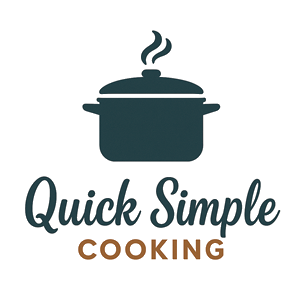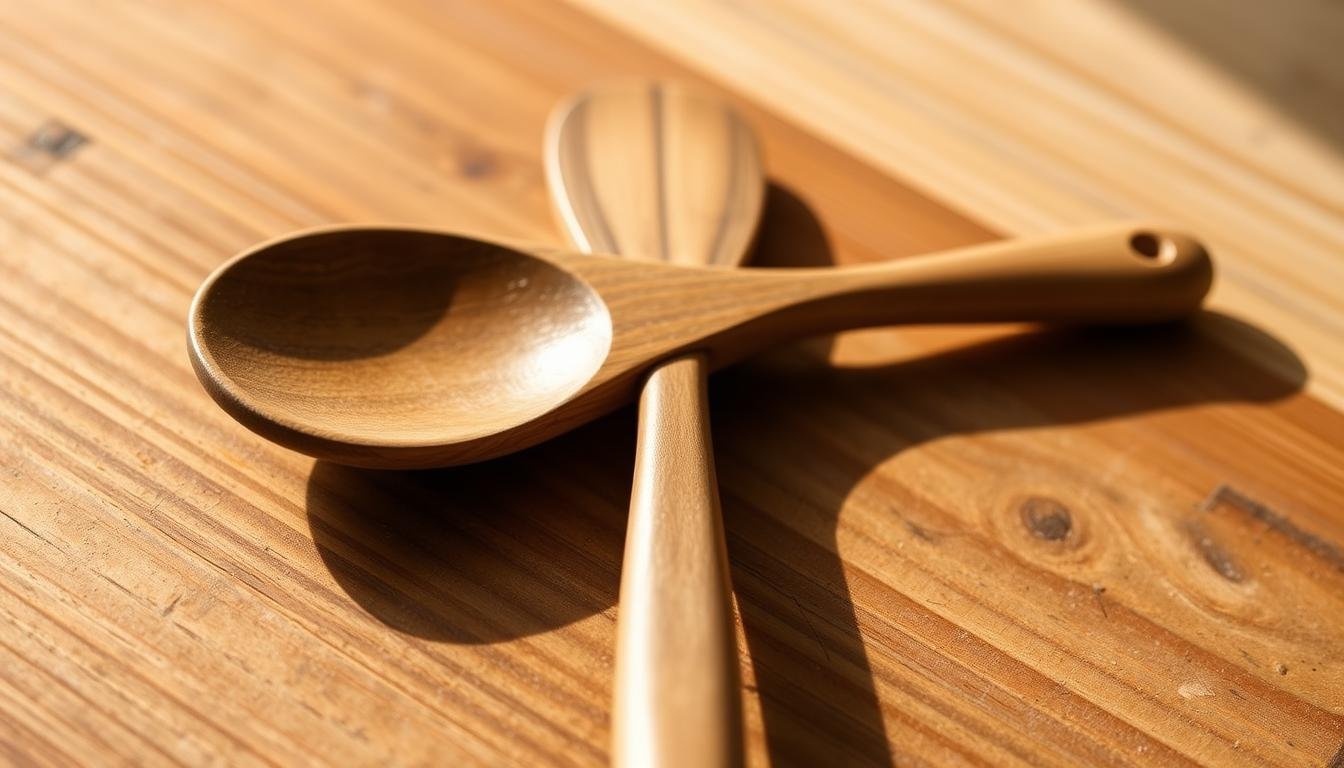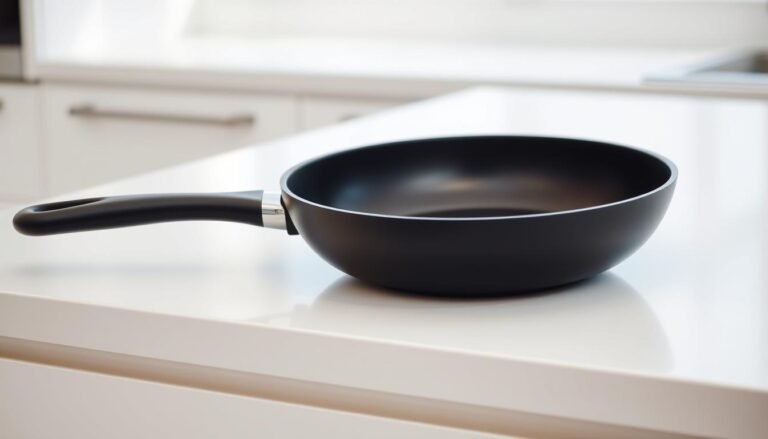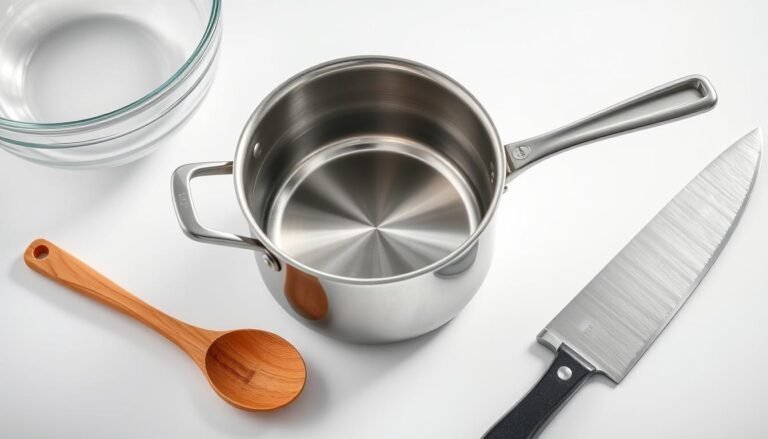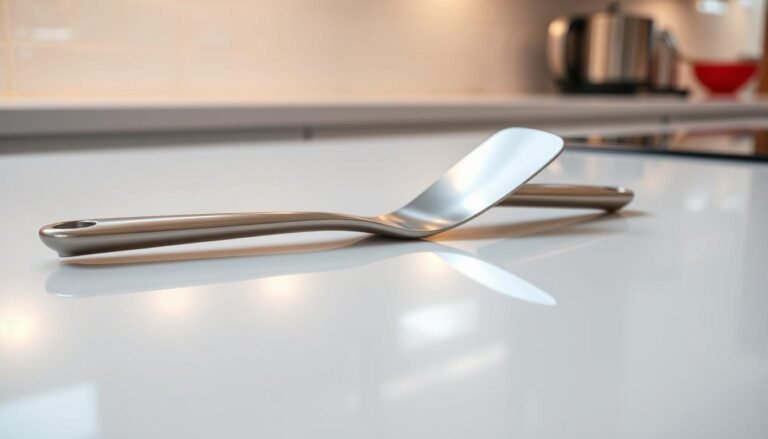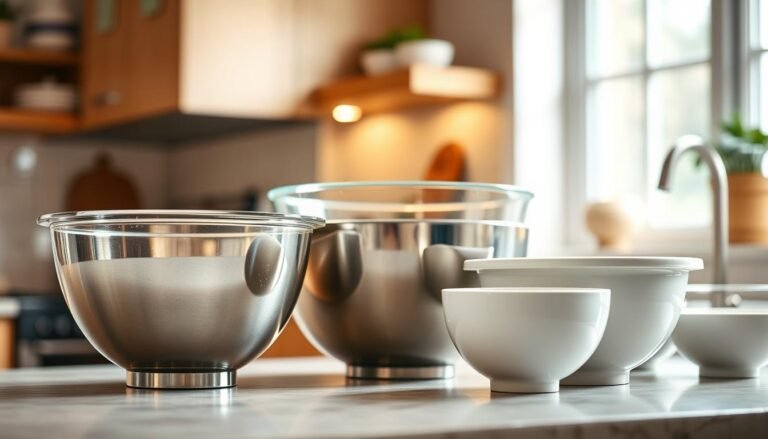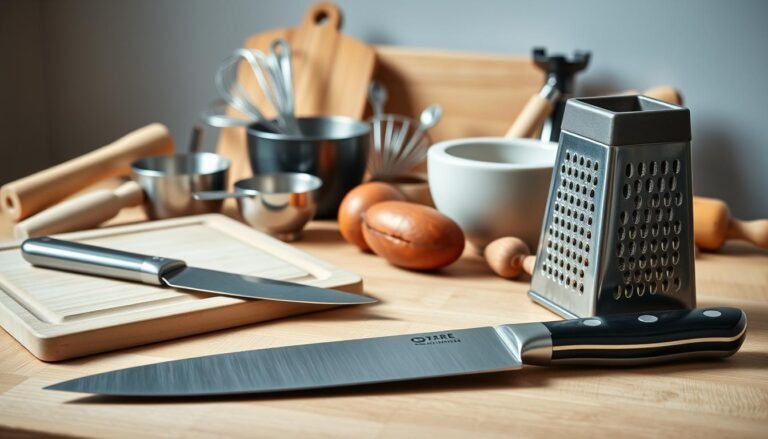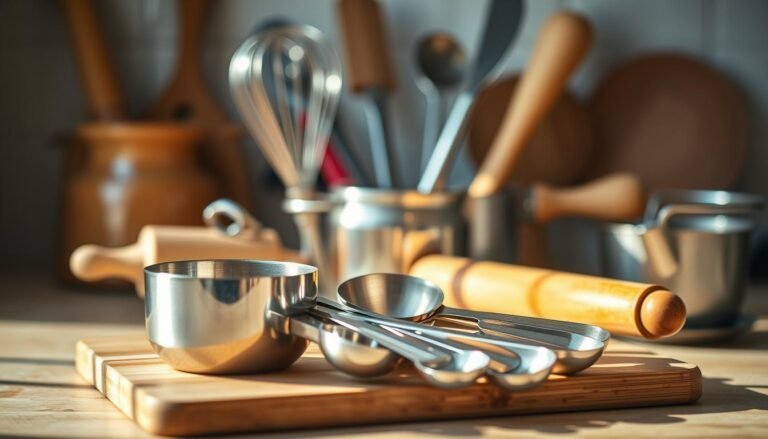Disclosure: This Post Contains Affiliate Links; We earn a commission on purchases.
A kitchen utensil that has stood the test of time, the wooden spoon is an essential tool for home cooks and professional chefs alike.
Its simple, gentle design makes it perfect for mixing and cooking without scratching nonstick ceramic pans or damaging cast iron skillets.
This timeless tool has been used for centuries in various culinary traditions. Its versatility in cooking techniques makes it a must-have in every kitchen.
Key Takeaways
- A versatile kitchen tool for gentle mixing and cooking.
- Prevents scratches on nonstick ceramic pans and cast iron skillets.
- A timeless utensil used in various culinary traditions.
- Essential for home cooks and professional chefs.
- Must-have tool for every kitchen.
The Rich History of Wooden Spoons in Culinary Traditions
For centuries, wooden spoons have been key in cooking traditions worldwide. They are a basic cooking tool used for stirring, mixing, and serving.
Ancient Origins and Evolution
Wooden spoons have been around for ages, found in many ancient sites. Their design and materials have changed over time. This change was due to the culture and place of their users.
Different woods were chosen in different places. This made wooden spoons diverse. You can find more about wooden spoon history on Wikipedia.
Cultural Significance Across Different Cuisines
Wooden spoons are more than just cooking tools. They hold deep cultural meaning in many societies. In some places, they symbolize hospitality and are used in traditional cooking.
Their eco-friendly nature has made them popular. They are a green choice compared to other utensils.
The Wooden Spoon: A Timeless Kitchen Essential
The wooden spoon has a long history and many benefits. It’s made from natural materials. This makes it a sustainable choice for cooking.
Natural Heat Resistance Properties
Wooden spoons can handle high temperatures well. They stay cool to the touch, even when stirring hot dishes. This is unlike metal spoons.
Gentle on Cookware Surfaces
Wooden spoons are gentle on cookware. This is great for delicate items that can break easily.
Protection for Non-Stick Coatings
Wooden spoons won’t scratch non-stick coatings. This is because they’re safe to use with these coatings.
Safe for Cast Iron and Enamel
They’re also safe for cast iron and enamel cookware. This helps keep these durable pots and pans in good shape.
Ergonomic Design and Comfort
The design of handmade wooden spoons is ergonomic. This means they’re comfortable to hold for a long time. The wood fits well in your hand, helping to prevent fatigue.
- Natural heat resistance
- Gentle on cookware surfaces
- Ergonomic design for comfort
Types of Wooden Spoons for Various Cooking Needs
Wooden spoons come in many types, each for different cooking needs. They vary because of the wood types and designs for specific tasks.
Different Wood Varieties and Their Characteristics
The wood type affects a spoon’s performance and life span. Each wood has special traits for different cooking uses.
Hardwoods: Maple, Cherry, and Walnut
Hardwoods like maple, cherry, and walnut are top picks for spoons. They’re durable and resist wear. Maple is light and fine-grained, cherry is rich and reddish, and walnut is dark and sturdy.
Olive Wood and Exotic Options
Olive wood and other exotic woods like teak or bamboo have unique features. Olive wood is valued for its beauty and durability. Exotic woods bring a special touch to your kitchen.
Specialized Shapes and Designs
Wooden spoons come in many shapes and sizes for various cooking methods. There are slotted spoons for draining and long-handled spoons for deep pots. Each design meets different cooking needs.
Artisanal vs. Mass-Produced Options
Choosing between artisanal and mass-produced spoons depends on your taste and budget. Artisanal spoons are made with care, giving them unique qualities. Mass-produced spoons are consistent and affordable. Think about what you need before deciding.
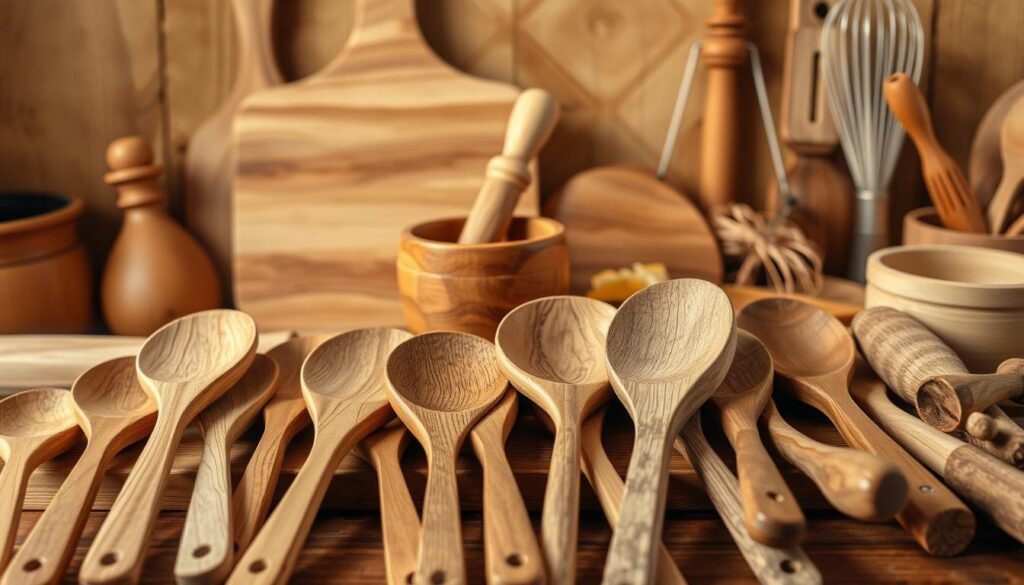
The Versatility of Wooden Spoons in Cooking Techniques
Wooden spoons are key for baking, stirring, or folding. They are a cooking essential and a kitchen utensil for centuries. They are great for many cooking tasks.
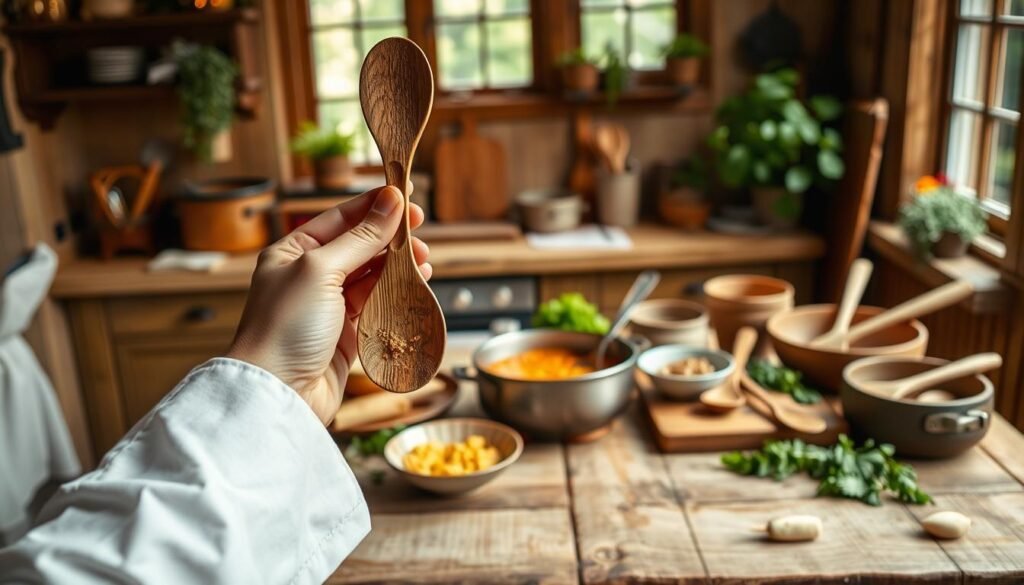
Ideal Applications in Baking
Wooden spoons are great for baking. They mix wet and dry ingredients gently. This keeps the batter’s texture right.
Perfect for Delicate Sauces and Custards
For making delicate sauces or custards, use a wooden spoon. It’s soft and won’t scratch. It stirs carefully, keeping the mix smooth.
Stirring and Folding Techniques
Stirring and folding are important in many recipes. A wooden spoon is perfect for these. Its soft edge is gentle on ingredients, mixing them evenly.
The Art of Gentle Mixing
Mixing gently needs patience and the right tool. A wooden spoon is great for this. It’s perfect for mixing batter or adding delicate ingredients.
Preventing Overmixing in Batters
Overmixing can mess up a dish, like batters. A wooden spoon stops this. It mixes gently, keeping ingredients intact.
Proper Care and Maintenance of Your Wooden Spoon
A well-maintained wooden spoon can last for years. To keep it in good shape, follow a few simple steps.
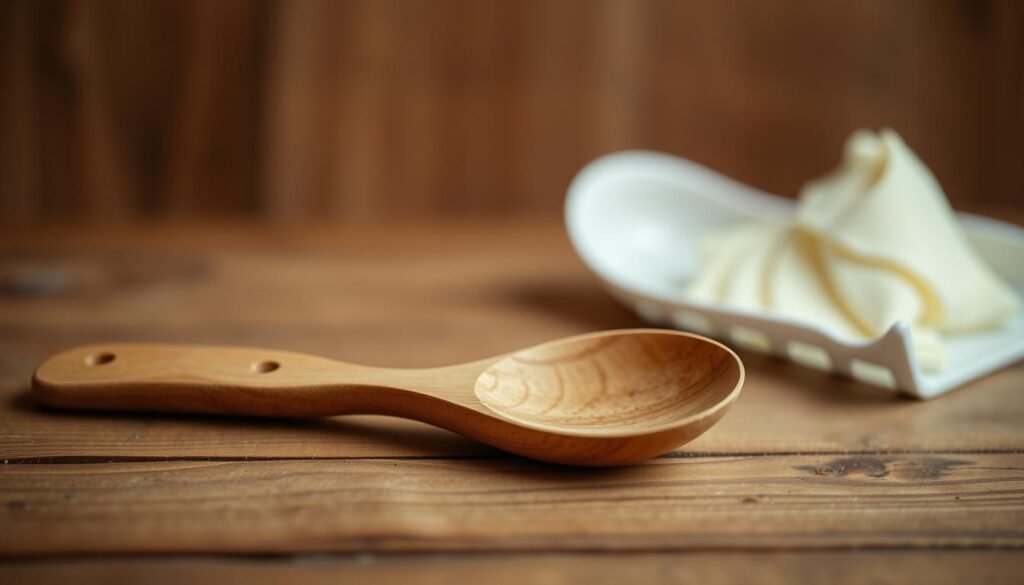
Cleaning Methods That Preserve Wood Quality
Cleaning your wooden spoon gently is key. Don’t use harsh detergents or the dishwasher. These can harm the wood.
Wash it by hand with mild soap and warm water. Dry it well to keep it safe.
- Wash with mild soap and warm water
- Dry immediately with a towel
- Occasionally sanitize with vinegar
Conditioning and Preventing Cracks
Regular conditioning prevents cracks and keeps the wood soft. Use a food-safe wood conditioner or mineral oil. Apply a small amount and rub it in well.
Tips for Conditioning:
- Apply conditioner or oil regularly
- Rub it in thoroughly to avoid excess oil
- Let it absorb before using the spoon again
When to Replace Your Wooden Utensils
Wooden spoons will show wear over time. Look for cracks, splinters, or a strong smell. If you see these signs, it’s time for a new spoon.
Environmental Benefits of Choosing Wooden Kitchen Tools
Wooden kitchen tools, like spoons, are better for the planet than plastic ones. They are a sustainable choice that helps the environment a lot.
Wooden tools are better for the earth than plastic ones. Wood grows back and can be cut down without harming the environment. Plastic, on the other hand, comes from oil and pollutes our planet.
Sustainability Compared to Plastic Alternatives
Wooden spoons last a long time with a little care. They don’t need to be thrown away often. This means less waste in our kitchens.
Biodegradability and Eco-Friendly Production
Wooden tools can break down naturally when they’re no longer needed. This is good for the earth. Also, many makers use green methods to make these tools. Choosing wooden tools helps support these efforts.
Selecting the Perfect Wooden Spoon for Your Kitchen
Finding the right wooden spoon is key. You need to know what makes a spoon great. Look at the wood quality, how it’s made, and the price.
Quality Indicators to Look For
For a top-notch wooden spoon, check the wood type, finish smoothness, and build. Maple or beech are best for lasting use. A good spoon has a smooth finish and a strong handle.
Price Range Considerations
Wooden spoon prices vary a lot. It depends on the wood, making, and brand. Basic spoons are under $5, but top ones can be over $20. Think about how much you’ll use it and if it’s worth the cost.
Recommended Brands and Artisans
Some brands and artisans make excellent wooden kitchen items, like spoons. Look for those who care about the environment and making things right. Brands that focus on woodenware share details about their materials and making. This helps you choose wisely.
Conclusion: The Timeless Appeal of the Wooden Spoon
The wooden spoon is a timeless kitchen tool. It combines function, sustainability, and tradition. It’s a must-have for cooks because of its versatility and charm.
Learning about wooden spoons’ history and care shows their value. It makes cooking more enjoyable.
For more on wooden kitchen tools, check out Earlywood Designs, Ancheng Bamboo and Wood Tableware Co., Ltd., and Holland Bowl Mill. They offer top-notch products. For details on the best wood for cooking utensils, visit Recime’s blog.
The wooden spoon is a key part of the kitchen. It’s important for cooking and helps make kitchens more sustainable.
FAQ
What are the benefits of using a wooden spoon in cooking?
How do I choose the right type of wood for my wooden spoon?
How do I properly care for and maintain my wooden spoon?
Can I use my wooden spoon for high-heat cooking?
Are handmade wooden spoons better than mass-produced ones?
How do I know when it’s time to replace my wooden spoon?
What are some eco-friendly production methods used for wooden kitchen tools?
Can I use my wooden spoon for both sweet and savory dishes?

With over a decade of experience turning everyday ingredients into reliable, crowd-pleasing meals, Ryan knows firsthand the frustration of wasting time and effort in the kitchen. He specializes in clear, no-fuss guidance—breaking down techniques, time-saving tips, and smart shortcuts so that even complete beginners feel empowered and confident.
Subscribe to Our Newsletter
